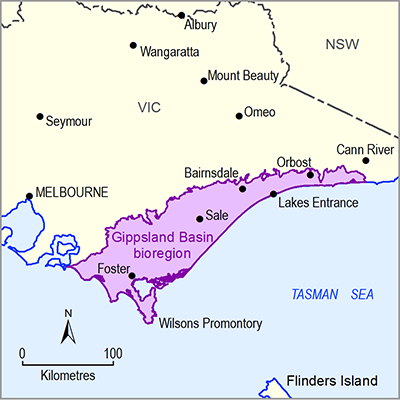- Home
- Assessments
- Bioregional Assessment Program
- Gippsland Basin bioregion
- 1.2 Resource assessment for the Gippsland Basin bioregion
- 1.2.2 Current activity and tenements
Summary
Brown coal is synonymous with the onshore geological Gippsland Basin and in particular the Latrobe Valley, which generates more than 43,000 GW hours of electricity (BREE, 2014; NEM, 2014) for the State of Victoria. This accounts for more than 80% of the state’s electricity output from the vast shallow coal deposits of the Oligocene to Miocene Yallourn and Morwell seams. The underlying Traralgon Formation seams are for the most part too deep to mine at the surface but are considered to have potential for coal seam gas (CSG) (Holdgate, 2003).
There are three coal mines currently operating in the geological Gippsland Basin (Gippsland Basin). These are Yallourn, Hazelwood and Loy Yang in the Latrobe Valley. The Loy Yang Mine is the largest mine in the Latrobe Valley and supplies approximately 29 million tonnes (Mt) of brown coal annually to two power stations, Loy Yang A and Loy Yang B. The Yallourn Mine is Australia’s second largest open-cut mine. It is adjacent to the Yallourn Power Station and annually mines around 13 Mt of high moisture brown coal. The Hazelwood Mine supplies 17 Mt of coal annually to the Hazelwood Power Station.

Product Finalisation date
- 1.2.1 Available coal and coal seam gas resources
- 1.2.2 Current activity and tenements
- 1.2.3 Proposals and exploration
- 1.2.4 Catalogue of potential resource developments
- Citation
- Acknowledgements
- Contributors from the Government of Victoria
- Contributors to the Technical Programme
- About this technical product
